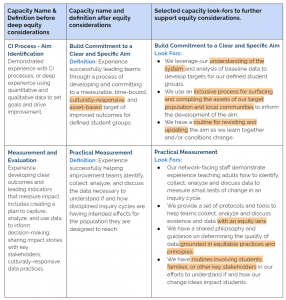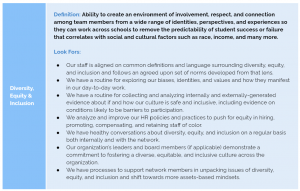 by Rachel Klein, Partner of Strategic Initiatives at Catalyst:Ed
by Rachel Klein, Partner of Strategic Initiatives at Catalyst:Ed
Since 2018, Catalyst:Ed has been supporting Networks for School Improvement (NSIs) – improvement networks funded by the Bill & Melinda Gates Foundation – to strengthen their capacity to facilitate critical improvement work in hundreds of schools, districts, and networks across the nation. One of the tools we use to support these networks is the Intermediary Capacity Framework (ICAF), which we created to be a practically-relevant and action-oriented tool for practitioners.
Centering equity throughout the framework was a critical priority for Catalyst:Ed because of our overall commitment to equity as an organization. For me, personally, it was important as I move along my journey to dismantle the systems of oppression in public education that I inadvertently helped to prop up for so many years as a district administrator and grantmaker. For the team of us that worked on developing the ICAF, equity means:
- Encouraging and valuing the lived experience of the people we are most trying to serve through our improvement efforts – the students and families in the schools that we partner with.
- Recognizing the power dynamics at play in all of the systems and structures that surround education in the United States and the lives of the students and families we are serving, and working at every turn to uproot those power dynamics to elevate and incorporate the ideas, voices, and influence of historically marginalized people.
- Regularly checking, questioning, and interrupting our thoughts and actions when they are rooted in bias or causing harm, and helping our partners do the same.
We chose to center equity primarily by asking – for each capacity – what would this look like if equity were truly in the foreground vs absent? Here are a few examples of how our capacities changed once we undertook this work:

And then, even though each capacity was thoughtfully considered, we still felt there needed to be a “Diversity, Equity, and Inclusion” capacity focused specifically on organizational and team dynamics around racial and gender equity. This capacity includes the following considerations:

We believe that this version of the ICAF centers equity more thoughtfully than previous versions, but we expect to continue to update the ICAF over time to incorporate lessons about the capacity necessary to fully infuse equity in improvement networks. We know that we need antiracist tools, systems, and processes if we are going to get the equitable student and societal outcomes that we seek, and so we would love your input! Drop us a note anytime at [email protected].
